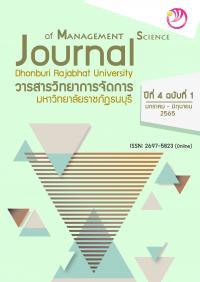พฤติกรรมและส่วนประสมการตลาดบริการในการเลือกซื้อคอนโดมิเนียมของผู้บริโภค ในเขตจังหวัดสมุทรปราการ
คำสำคัญ:
พฤติกรรมผู้บริโภค, ส่วนประสมการตลาดบริการ, คอนโดมิเนียมบทคัดย่อ
การวิจัยนี้มีวัตถุประสงค์เพื่อ 1) ศึกษาพฤติกรรมการเลือกซื้อคอนโดมิเนียมของผู้บริโภคในเขตสมุทรปราการ 2) วิเคราะห์องค์ประกอบส่วนประสมการตลาดบริการในการเลือกซื้อคอนโดมิเนียมของผู้บริโภคในเขตสมุทรปราการ และ 3) ศึกษาระดับการตัดสินใจเลือกซื้อคอนโดมิเนียมในเขตสมุทรปราการตามแนวคิดส่วนประสมการตลาดบริการ ประชากรที่ศึกษาคือ ผู้บริโภคในจังหวัดสมุทรปราการเลือกเป็นกลุ่มตัวอย่าง จำนวน 400 คน ด้วยวิธีการสุ่มตัวอย่าง วิเคราะห์ข้อมูลด้วยการแจกแจงความถี่ ร้อยละ ค่าเฉลี่ย ส่วนเบี่ยงเบนมาตรฐาน และการวิเคราะห์องค์ประกอบเชิงยืนยัน ผลการวิจัยพบว่า 1) พฤติกรรมการเลือกซื้อคอนโดมิเนียมมีวัตถุประสงค์เพื่อให้มีที่พักที่ใกล้กับสถานที่ทำงานมากที่สุด แสวงหาข้อมูลคอนโดมิเนียมผ่านสื่ออินเทอร์เน็ตหรือเว็บไซต์เป็นหลัก บุคคลที่มีอิทธิพลต่อการเลือกซื้อคอนโดมิเนียมคือ ตัวผู้ซื้อเอง ห้องที่เลือกซื้อนั้นเป็นห้องแบบสตูดิโอมากที่สุด ส่วนใหญ่เลือกห้องที่มีพื้นที่ใช้สอย 26-30 ตารางเมตร งบประมาณการซื้ออยู่ระหว่าง 1,000,001-2,000,000 บาท มากที่สุด 2) องค์ประกอบการเลือกซื้อคอนโดมิเนียมของผู้บริโภคในเขตสมุทรปราการเป็นไปตามแนวคิดส่วนประสมการตลาดบริการ องค์ประกอบที่มีน้ำหนักองค์ประกอบมาตรฐานมากที่สุดคือ ผลิตภัณฑ์ รองลงมา ได้แก่ ราคา การส่งเสริมการตลาด สถานที่/ที่ตั้ง ลักษณะทางกายภาพ กระบวนการให้บริการ และบุคลากร ตามลำดับ และ 3) การตัดสินใจเลือกซื้อคอนโดมิเนียมตามแนวคิดส่วนประสมการตลาดบริการอยู่ในระดับมากทุกด้าน เรียงลำดับค่าเฉลี่ยจากมากไปน้อยคือ ราคา ผลิตภัณฑ์ บุคลากร สถานที่/ที่ตั้ง การส่งเสริมการตลาด ลักษณะทางกายภาพและกระบวนการให้บริการ ตามลำดับ
เอกสารอ้างอิง
กระทรวงการท่องเที่ยวและกีฬา. (2563). รายงานภาวะเศรษฐกิจการท่องเที่ยว. COVID-19 กับผลกระทบต่อการท่องเที่ยวไทย. 1(4), 4-26. สืบค้นจาก https://www.mots.go.th/download/TourismEconomicReport/4-1TourismEconomicVol4.pdf
กระทรวงการท่องเทียวและกีฬา. (2565). รายงานภาวะเศรษฐกิจการท่องเที่ยว. BCG. 3(1), 86-94. สืบค้นจาก https://www.mots.go.th/news/category/663
กองเศรษฐกิจการท่องเที่ยวและกีฬา กระทรวงการท่องเที่ยวและกีฬา. (2564, 13 มกราคม). สถานการณ์ด้านการท่องเที่ยวไทย. สืบค้นจาก https://secretary.mots.go.th/policy/
ณัฐวุฒิ เผ่าทวี. (2563, 4 พฤษภาคม). คาดการณ์พฤติกรรมมนุษย์และเศรษฐกิจโลกหลังโควิด.สืบค้นจาก https://www.prachachat.net/d-life/news-459514
ปิยพร อรุณเกรียงไกร. (2563, 1 กรกฎาคม). Future of Travel: อนาคตของการท่องเที่ยวอยู่ตรงไหนในยุคโควิด-19. สืบค้นจาก https://www.creativethailand.org/view/article-read?Article_id=32496
รพีพรรณ รัตนวงศ์นรา มอร์ด. (2563, 22 กุมภาพันธ์). วิธีป้องกันเชื้อไวรัสโคโรนา 2019 (COVID-19). สืบค้นจาก https://www.rama.mahidol.ac.th/atrama/issue035/health-station
ศูนย์ปฏิบัติการภาวะฉุกเฉิน กรมควบคุมโรค. (2565, 11 พฤษภาคม). รายงานสถานการณ์โรคติดเชื้อไวรัสโคโรนา 2022. สืบค้นจาก https://ddc.moph.go.th/viralpneumonia/index.php
ศูนย์วิจัยธนาคารกรุงไทย. (2563, 22 สิงหาคม). เจาะพฤติกรรมท่องเที่ยวใน New Normal: เมื่อโควิดทำชีวิตเปลี่ยน. สืบค้นจาก https://krungthai.com/th/krungthai-update/news
สยามรัฐออนไลน์. (2563, 10 เมษายน). โควิด-19 ส่งผลกระทบต่อภาคอุตสาหกรรมท่องเที่ยวไทย เป็นอันดับหนึ่งของโลก. สืบค้นจาก https://siamrath.co.th/n/146002
องค์การอนามัยโลกประเทศไทย. (2565, 12 พฤษภาคม). Coronavirus (Thailand). สืบค้นจาก https://www.who.int/thailand/health-topics/coronavirus
Divisekera, S. & Nguyen, V. K. (2018). Determinants of innovation in tourismevidence from Australia. Tourism Management. 67:157-167.
Flor, M. L., Cooper, S. Y., & Oltra, M. J. (2018). External knowledge search, absorptive capacity and radical innovation in high-technology firms. Journal ofEuropeanManagement. 36(2):183-194.
Fuchus, M. et al. (2019). E-business readiness, Intensity, and Impact: An Austriandestination management organization study. Journal of Travel Research. 49(2):165-178.
He, Z. et al. (2018). When art meets tech: Th e role of augmented reality inenhancingmuseum experiences and purchase intentions. Tourism Management. 68:127-139.
ICAO. (2022, 5 May). Effects of Novel Coronavirus (COVID‐19) on Civil Aviation: EconomicImpact Analysis. Retrieved from https://www.icao.int/sustainability/Pages/Economic-Impacts-of-COVID-19.aspx
Khatri, I. (2018). Innovation research in tourism business: A review from twodecades of studies. Journal of Tourism. 19(1):15-27.
Li, J. et al. (2018). Media representation of digital-free tourism: A critical did courseanalysis. Tourism Management, 69:317-329.
Longwoods International. (2022, 21 May). Travel Sentiment Study Wave 7. Retrieved from https://longwoods-intl.com/news-press-release/covid-19-travel-sentiment-study-wave-7
Loten, A. (2017). Digital business, software drive IT spending growth. Journal of Wall Stree.Januszewska, M., Jaremen, D. E. &Nawrocka, E. (2015). The effects of the use of ICT by tourism enterprises, Service Management. 2(16):65-73
McKinsey. (2020, 14 May). Hitting the road again: How Chinese travelers are thinking aboutTheir first trip after COVID-19. Retrieved from https://www.mckinseycom/featured-insights/asia-pacific/hitting-the-road-again-how-chinese-travelers-are-thinking-about-their-first-trip-after-covid-19#
Neidhardt, J., & Werthner, H. (2018). IT and tourism: still a hot topic, but do not forget IT. Information Technology & Tourism. 20:1–7
UNWTO. (2020, 29 October). International Tourism Down 70% as Travel Restrictions ImpactAll Regions. Retrieved from https://www.unwto.org/taxonomy/term/347
World Health Organization. (2020, 12 October). WHO Coronavirus Disease (COVID-19) Dashboard. Retrieved from https://covid19.who.int/?gclid=Cj0KCQjwuL_8BRCXARIsAGiC51BjNjLZSUekpV7CxQP0g7vRCnHxpSiV66xPxTeYIOmvc1yi8glEhgaAvciEALw_wcB
Watkins M., Ziyadin S., Imatayeva A., Kurmangalieva A.,&Blembayeva A. (2018). Digitaltourismas a key factor in the development of the economy .Economic Annals-XXI. 169(1-2): 40-45
Ziyadin, S., Suieubayeva, S., &Utegenova, A. (2020). Digital Transformation in Business. Lecture Notes in Networks and Systems. 84: 408-415
Ziyadin S., Koryagina E., Grigoryan T., Tovma N.,& Ismail G. (2019). Specificity of using information technologies in the digital transformation of diversification tourism. International Journal of Civil Engineering and Technology (IJCIET) Volume 10. 1:998-1010
Ziyadin, S., Oleg, L., Marina, D., Gulzhihan, S., & Maiya, S. (2019). Diversification tourism in the conditions of the digitalization. International Journal of Civil Engineering and Technology. 10(2):1055-1070
ดาวน์โหลด
เผยแพร่แล้ว
รูปแบบการอ้างอิง
ฉบับ
ประเภทบทความ
สัญญาอนุญาต

อนุญาตภายใต้เงื่อนไข Creative Commons Attribution-NonCommercial-NoDerivatives 4.0 International License.







